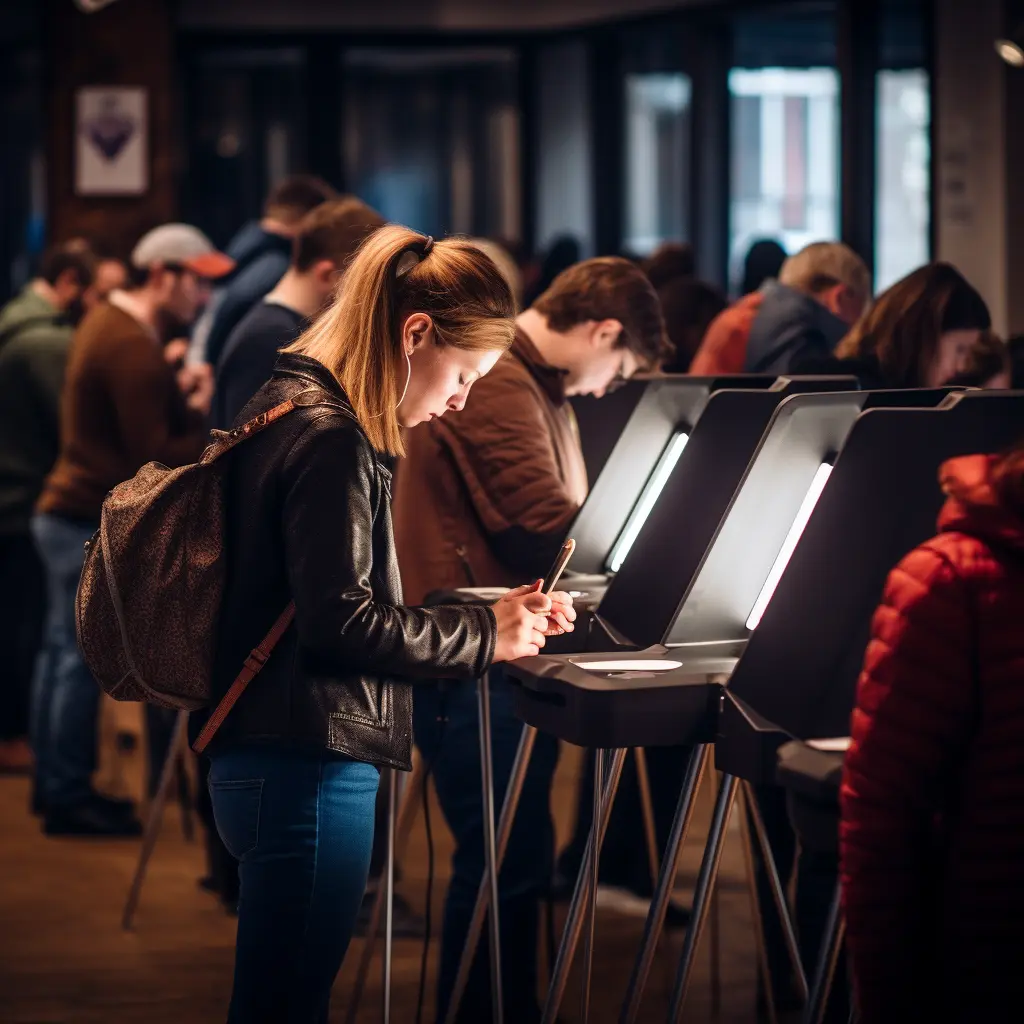The Power of Democracy: Casting Light on the Essence of Voting in Western Australia
Voting is the heartbeat of Western Australia’s democratic system. It’s a process that allows the community to voice their opinions, make choices, and collectively shape the future of this remarkable state.
Australian Christians, a political party grounded in values that resonate with many, understands the importance of every individual’s voice, mirroring the ethos of the democratic process.
Before delving into how voting in Western Australia works, let’s take a moment to acquaint ourselves with Australian Christians.
Our political party reflects the values and beliefs deeply rooted in Christian principles.
Our mission extends beyond mere politics; it encompasses the desire to represent and advocate for the Christian community and like-minded individuals across the state.
Australian Christians bring a unique perspective to the political landscape of Western Australia, one steeped in compassion, ethics, and a commitment to serving the greater good. Our presence in the political arena echoes the diverse tapestry of voices that collectively participate in the democratic process, making it all the more robust and inclusive.

Voting in a Democratic System
The act of voting is a potent tool that empowers individuals to influence governmental decisions, shape policies, and determine the overall trajectory of the state. It’s the cornerstone of a thriving democracy, a process that transcends the individual and becomes a collective force for change.
The Electoral Commission , in its unwavering commitment to preserving the integrity of the democratic system, recognises the significance of each and every vote cast.

It understands that the democratic process is not just about elections; it’s about ensuring that the voting process itself is convenient, accessible and inclusive to all members of the community.
As we explore voting in Western Australia, we’ll also touch on the efforts undertaken by the Western Australian Electoral Commission to make the process both convenient and accessible.
We’ll explore the ways in which our WA state democracy empowers West Australians to have their voices heard, shaping the very fabric of our state’s future.
Join us as we navigate through the heart of democracy, where every vote counts, and every voice matters.
Voting Options in Western Australia
Before Election Day: Electors have the flexibility to cast their votes ahead of the official polling day. This can be achieved through:
- Postal voting: A method where electors can apply to receive their ballot papers via post and send them back once filled out.
- Early voting centres: Designated locations where electors can visit in person and cast their votes before the actual polling day.
On Election Day: On the designated day, electors can visit their assigned polling places to cast their votes in person.

Assistance for Electors: Catering to the Elderly and Handicapped The Commission is unwavering in its commitment to ensuring that every individual, regardless of their circumstances, can participate in the electoral process. Recognising that certain members of the community may have specific needs, the Commission has taken significant steps to implement services that cater to these requirements.
Guidance for Enhanced Voting Assistance
The Commission, in its commitment to inclusivity, offers a diverse array of services, employing advanced equipment to support electors with varied needs in their voting process.
Digital Voting Solutions
Under the provisions of the Electoral Act, electors who face challenges in traditional voting methods due to literacy limitations, visual impairments, or other incapacities, are permitted to utilise electronic mediums like telephones or computers for voting.
For the 2025 State general election, electors can avail themselves of two primary digital voting methods:
Telephonic Voting System
- Dial 13 68 00 (International callers: +61 8 9214 7290)
- This system facilitates eligible electors to cast their votes telephonically. After confirming their enrolment through a dedicated call centre, they can proceed to another call centre to cast their vote. Here, Commission representatives will audibly present the voting guidelines and ballot details. The elector then communicates their voting choices, with the process meticulously designed to maintain voter confidentiality.
Vote Assist Mechanism
- This mechanism empowers electors to visit specific venues where they can access pre-recorded voting directives and ballot details. They can then indicate their choices using a tailored keypad, culminating in the automatic printing of their filled-out ballot papers. This service is accessible throughout the early voting phase.
Alternative Voting Modalities
Mobile Ballot Stations
- These stations, operated by mobile polling teams, potentially visit hospitals, specific institutions, and senior care establishments, delivering an in-person voting experience to their permanent inhabitants.
Advance Voting Hubs
- For those who find it challenging to visit a polling station on the actual polling day, numerous advance voting hubs will be operational across the State from early 2025.
Postal Balloting
- Any elector can request a postal vote. The most straightforward method is online application during election seasons. Alternatively, one can also solicit a postal vote application form via post. Notably, some senior or incapacitated electors choose to register as General Early Voters, ensuring they automatically receive postal votes during the State election.
Accessible Voting Stations
- Electors facing mobility constraints can request the Polling Place Manager to bring the ballot papers to their vehicle, enabling them to vote without leaving their car.
- Polling venues prioritising wheelchair accessibility are distinctly marked with a wheelchair icon. Proximity parking for accessibility is strategically located near the polling venue entrance.
- Every polling venue is equipped with a table-top voting screen, allowing electors to vote while seated, be it in a wheelchair or a regular chair. Additionally, magnifying sheets, enhanced auditory cards, and ergonomic pencils are available.
- The Commission emphasises the importance of every elector’s right to a confidential and autonomous voting experience. Should you require guidance or face challenges in the voting process, assistance from polling officials, caregivers, acquaintances, or family members is available.
Specialised Voting Centres with Enhanced Accessibility
Beyond the standard assistive tools available at all polling venues, these specialised centres also offer:
Audio Loop or Hearing Amplifier: In bustling environments, traditional hearing aids might not be effective. Audio loops amplify specific sounds, like a polling official’s voice. Electors with compatible hearing aids can activate the ‘T’ setting to utilise this feature.
Reading Assistance Pen: Beneficial for electors grappling with literacy challenges or those for whom English poses a reading barrier. This pen, when moved over text, audibly reads it out.
Digital Magnification Display: This tool magnifies ballot details, aiding electors who need visual support.
Guidelines for Caregivers
Caregivers have ample opportunities to vote during elections. Moreover, it is imperative that they are equipped with the necessary information to facilitate the participation of those under their care in the electoral process, provided they are capable.
Engagement with Indigenous Voters
For Aboriginal and Torres Strait Islander residents of remote regions in Western Australia, the electoral process presents a unique set of logistical hurdles. In response the Commission has implemented specific strategies and initiatives tailored to support these Indigenous voters.
Outreach Polling in Remote Areas Dedicated mobile polling squads make their way to the majority of distant towns and settlements that won’t host a polling station on the designated election day.
Information regarding the exact locations, dates, and timings for this outreach polling is disseminated within the respective communities well ahead of the scheduled date. Additionally this information is shared with the election candidates representing those areas.
Extended Polling Services in Isolated Communities During electoral events, the Commission’s objective is to offer extended polling services to more populous remote communities, endeavouring to do so even on the main polling day when feasible.
Multilingual Support and Localised Assistance On the day of polling, commission staff members will adorn badges indicating any additional languages they are proficient in, apart from English. This ensures they can offer guidance in those languages when required.
In an effort to make the voting process more seamless and relatable, the Commission, whenever feasible, seeks to onboard local inhabitants as polling representatives. This approach not only provides employment opportunities but also enhances the overall voting experience for the electorate.
Pre-Election Voting in State Elections
It’s widely acknowledged by many, including the Australian Christians, that not everyone can make it to the polling stations on the designated election day due to various reasons.
The Commission has made provisions for such scenarios, offering multiple avenues for eligible voters to cast their vote in advance, all while adhering to the strict guidelines set by the electoral commission.
Criteria for Pre-Election Voting Post the 2016 amendments to the Electoral Act 1907, any voter eligible for a State election can opt for an early vote, either in person or through the post. The era of needing specific reasons to vote early has been left behind.
In-Person Pre-Election Voting For the 2021 election, the WA Electoral Commission, in collaboration with the WA Department of Health, took measures to address COVID-19 related concerns.
With an eye on the 2025 election, the Commission suggests that those who might be hesitant about visiting a polling station on the main election day consider voting ahead of time, either via a postal ballot or at a designated early voting centre.
Mobile Polling Facilities During the election season, the Commission extends its reach to various institutions such as hospitals, nursing homes, and retirement homes, ensuring residents can cast their vote without leaving their premises.
Additionally, special mobile polling teams are dispatched to Indigenous communities, mining regions, and other remote areas of Western Australia to ensure everyone has access to the voting process.
However, it’s essential to note that this mobile polling service is tailored primarily for the residents or patients of these facilities. For staff and visitors, the option to vote ahead of time at a designated centre or on the main polling day remains open.
Option for Regular Pre-Election Voting Certain conditions might qualify an individual for the ‘general early voter’ status. This designation ensures that once an election is announced and the ballots are ready, they’re promptly sent to the voter via post.
Eligibility Criteria To be classified as a general early voter, one must:
- Live more than 20 kilometres from the nearest polling station.
- Be in a hospital or a similar institution.
- Be hindered by a severe illness that prevents travel to a polling station.
- Be caring for someone with a critical ailment.
- Be aged 70 or above.
- Be registered either as an overseas or silent voter.
- Have religious beliefs or affiliations that prevent them from attending a polling station during its operational hours.
To secure this status, eligible individuals must complete the ‘general early voter’ form, which can be submitted whenever convenient.
Obligation to Cast Your Vote in State Elections
In State general elections, by-elections, and referenda, casting a vote is mandatory.
If you’ve missed voting in a State election or referendum, you might receive a communication – be it an email, text, or a mailed letter – asking for clarification regarding your absence from the voting process.
It’s essential to promptly reply to these messages or fill out the provided form and send it back using the enclosed envelope.

Those who neglect their voting duty during a State election and don’t offer a legitimate and adequate reason for their absence are subject to penalties.
A first-time oversight results in a $20 fine. However, if you’ve been penalised or convicted for this offence before, the fine escalates to $50. If you acknowledge the oversight and lack a valid reason for not voting, settling the penalty concludes the matter.
Ignoring these notices or evading the stipulated fine might lead to the case being handed over to the Fines Enforcement Registry, potentially resulting in the suspension of your driving licence.
It’s crucial to settle any penalties by the specified deadline on the relevant notice. If a payment deadline is missed, await the subsequent notice for updated payment details.
For any uncertainties related to a non-voting notice, reach out to nonvoter@waec.wa.gov.au.
Here’s a breakdown of the notices you might encounter:
Initial Notice: Form 33 (White) Dispatched within three months post the election or by-election, this form offers you a platform to elucidate your reasons for missing the vote. You can either mail back the form or email your justification, along with the infringement number, to nonvoter@waec.wa.gov.au. If your rationale is deemed acceptable, no further action is taken. If not, it’s advisable to settle the fine mentioned in the notice. Responses should be timely, as per the date mentioned on the notice.
Subsequent Notice: Form 34 (Green) This is sent if there’s no response to the initial notice or if the provided reason isn’t deemed satisfactory. Even at this stage, you can email your justification, along with the infringement number, to nonvoter@waec.wa.gov.au. Settling the fine or offering a valid reason concludes the matter. The penalty remains consistent with the initial notice.
Final Notice (Blue): If the previous notices go unanswered, this final demand is sent. At this juncture, an additional fee is levied as per the Fines Enforcement legislation, raising the total payable amount. Settling the fine or offering a valid reason concludes the matter. Responses should be timely, as per the date mentioned on the notice.
Referral to Fines Enforcement Registry Post the three notices, unresolved matters are directed to the Fines Enforcement Registry (FER) under the following circumstances:
- The fine remains unpaid.
- No valid reason for missing the vote is provided.
FER then issues a ‘Notice of Intention to Enforce’, which incorporates substantial fees over and above the original penalty. From this point onwards, the Western Australian Electoral Commission cannot accept payments. All dues must be settled with the Fines Enforcement Registry. If you’ve overlooked all prior notices but believe you have a valid reason for not voting, you can still email your justification to nonvoter@waec.wa.gov.au.
Ignoring the FER’s ‘Notices of Intention to Enforce’ can lead to severe repercussions, including potential suspension of your driver’s licence or the issuance of an enforcement warrant to recover the outstanding amount.
How to fill in your voting slip – a simplified explanation
In a national election, you’ll be casting your vote to select representatives for the two chambers of the Australian Parliament: the House of Representatives and the Senate.
You’ll be given two voting slips:
- A green slip for selecting a representative from your local region (or electoral division) to the House of Representatives.
- A white slip for choosing a representative for your state or territory in the Senate.

Guidance on how to cast your vote is detailed on the voting slips. Should you encounter any errors or feel uncertain about the process, simply seek assistance from a polling official.
Preparing to Vote:
- Ensure you’re enrolled to vote before election day.
- Bring ID or your voter card (if you have one) and head to your designated polling place.
At the Polling Place:
- Approach the official’s desk. They’ll check your name on the electoral roll.
- You will be handed two ballot papers:
- A green one for the House of Representatives.
- A white one for the Senate.
Voting in the House of Representatives (green ballot paper):
- Inside the polling booth, you’ll find a pencil (though you can use your pen if you prefer).
- On the green ballot paper, number every box in order of your preference, with ‘1’ being your first choice, ‘2’ being your second choice, and so on until every box has a number.
Voting in the Senate (white ballot paper): You have two options here:
Above-the-line voting:
- Number at least 6 boxes, from 1 to 6, for the parties or groups in the order of your preference.
Below-the-line voting:
- Number at least 12 boxes, from 1 to 12, for individual candidates in the order of your preference. You can continue numbering beyond 12 if you wish to express further preferences.
(Note: Voting requirements, especially for the Senate, can change. Always check the instructions on the ballot paper and follow them carefully.)
Submitting Your Ballot:
- Once you’ve filled out both ballot papers, fold them and place them into the respective ballot boxes (there will be separate boxes for the House of Representatives and the Senate).
Remember, it’s essential to fill out the ballot papers correctly to ensure your vote counts. If you’re unsure about anything, ask a polling official for guidance. They’re there to help!
The Imperative of Civic Participation
The act of voting is not merely a right but a civic duty, a cornerstone of a thriving democracy. The mechanisms and regulations set by the Commission ensure that every eligible individual has ample opportunity and means to participate in the electoral process.
While the system is designed to be accommodating, it also emphasises the importance of each vote, as reflected in the procedures for non-compliance.
As citizens, it’s crucial to stay informed, understand our responsibilities, and actively engage in shaping the future of our community and nation. Let’s embrace the privilege of voting, ensuring our voices are heard and our choices are counted.











